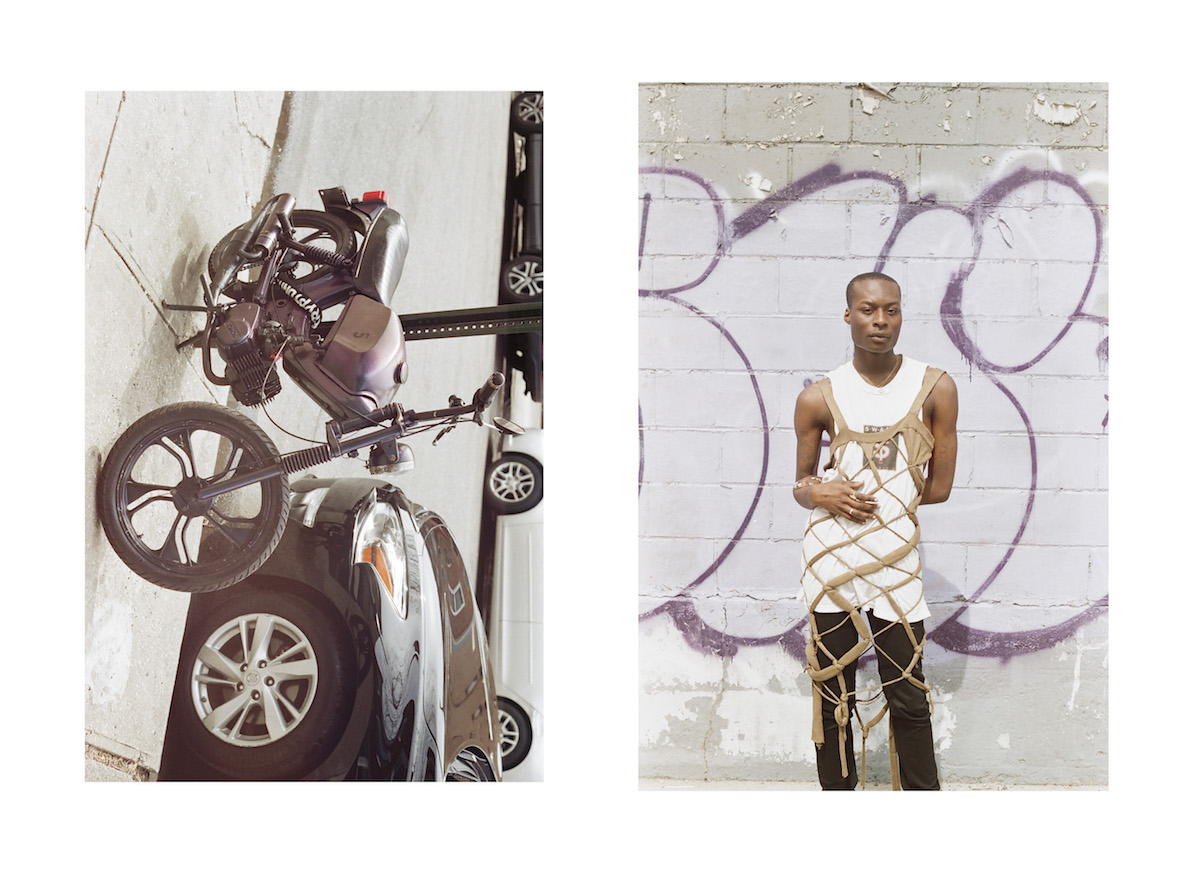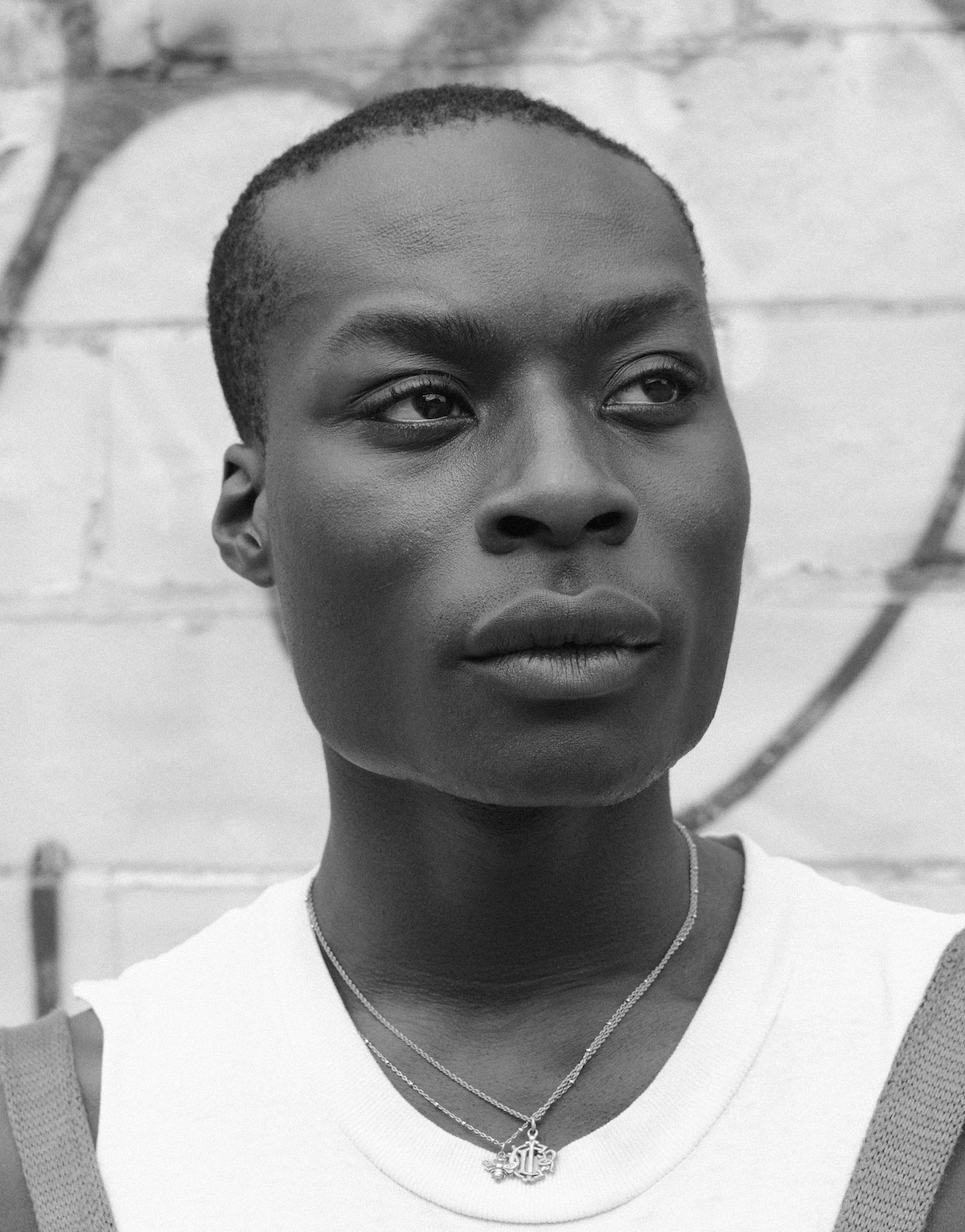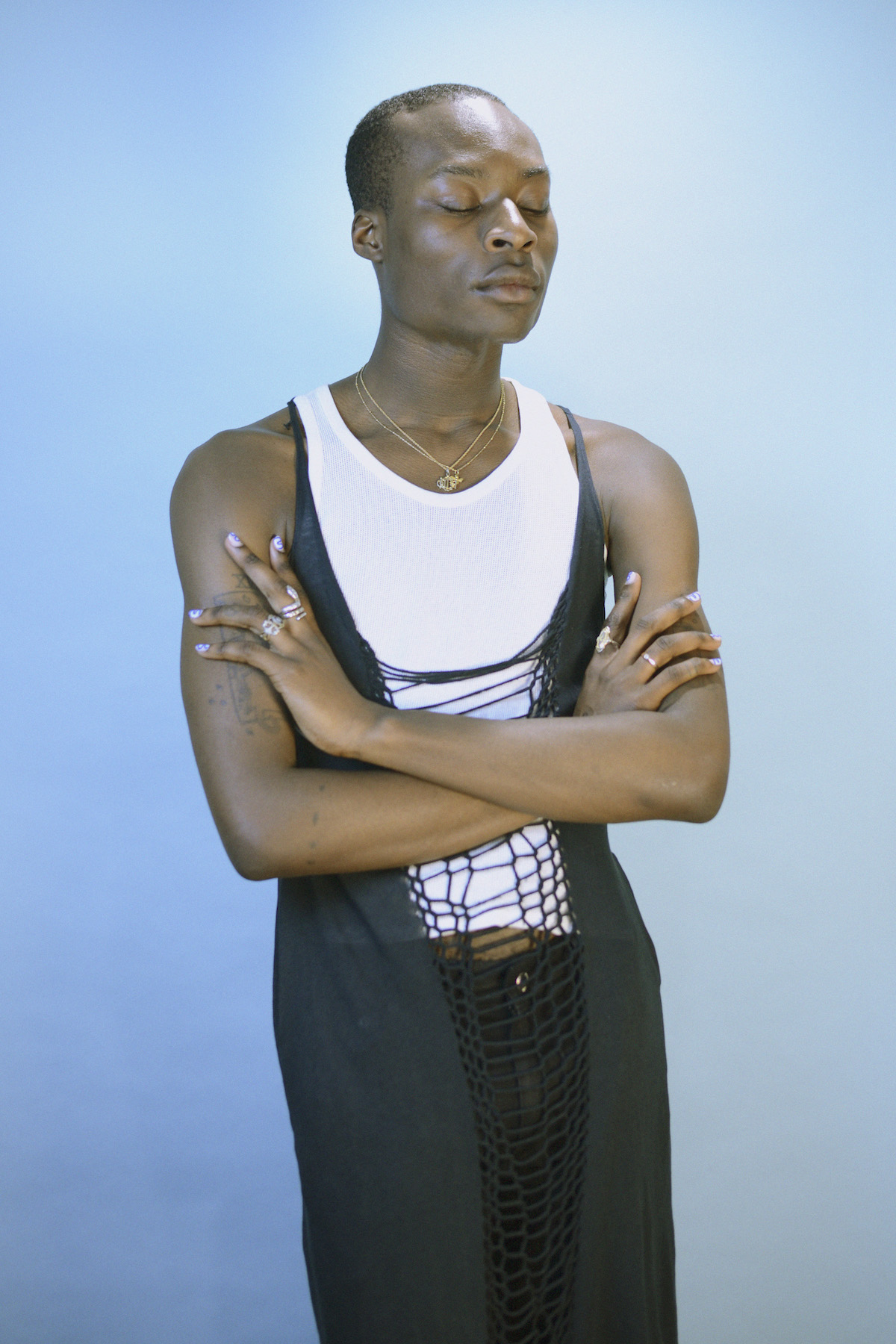The Reverse Columbus Carry: An Interview with Writer Jahmal B. Golden
Culture — 16.08.17

Entire look Devan Freedman
Jahmal called me – they are lost. This is something that happens quite often to people who are trying to reach my apartment. I live on Schaefer street somewhere in Brooklyn on the other side of a dead-end. This is extremely inconvenient and regularly changes the moods of people that come to visit. Jahmal is coming here because all of their things are packed away as they are about to leave for L.A in a few days, they are crashing at friends as is the New York way of transitioning into or out of the city. They walk in through my front door, I apologise for not remembering that the dead-end exists, they shake their head, “It happens” they say as they pull out coconut water and chug.
The doorbell rings, a man from DHL is on the other side of the door, he’s upset, shouting that he almost lost his job because of a complaint I made. He does not know that the complaint was made by my roommate or that I was signing for her package. The angrier the man gets the closer Jahmal moves towards me. The DHL man has not yet seen Jahmal, but Jahmal watches my face, waiting for the man’s anger to turn into something more. I appease the delivery man; I understand what the prospect of no income can do to someone. My understanding and quiet tone are enough for him to apologise, but an apology only done in the hope that someone calls to rectify the situation. When the door is closed, the idea of what it means to appease another soul is all that is left. It is surprising sometimes how there is no room for responding anger where there should be room for it. A person needs a job in this city; it is the reason my roommate wasn’t home to sign for her own package. My understanding of his deep fear was because I had become accustomed to that same fear as I sent in job application after job application. What can you do but appease another when you understand? Yet I couldn’t help but think what the cost of taking someone else’s unwarranted anger could mean for others.
“Shit, what the fuck?” Jahmal mutters as they chug some more coconut water. ‘Thanks’ I said, ‘that wasn’t even my fucking package.’ That was all I said to acknowledge that Jahmal had stood behind the door, hovering just in case they needed to protect me.
Jahmal B Golden is a writer, a performer and was in collaboration with RAGGA NYC at the New Museum in New York. They also have a book of poetry “Yves, Ide, Solstice.” currently available for purchase on the Easy Village Publishing website. They bring with them, their copy of the book. It is a lime green cover with a fading purple design. It is the kind of book you find in a tiny store and can’t help but open. The title, the cover, and the name of the artist is enough to drive the kind of curiosity that demands at least the reading of the first page.
Jahmal is gender neutral and does not identify as he or she but as they. This is important and something I find out towards the middle of the interview. Jahmal requests for songs by Little Dragon as the soundtrack that accompanies this interview.

Patricia Ellah: What kind of music do you listen to?
Jahmal: As far as music goes, I listen to heaps of it – they laugh – I tend to like more ambient sounds because it helps when I am thinking about writing or performance art. My favourite band is Gauntlet Hair. If I meet anyone out there that actually listens to them, I’d be so surprised! Right now, I’m into this group Skeemask. I don’t actually know what they look like and I think it’s better, but their music is really good. I’ve started to realise why artists can become very jaded. A lot of ‘becoming an artist’ is based on how you look now and how you can be compartmentalised. Like they would like to put all the black people in one circle or the queer people in one circle. The art world takes people’s identities and uses it for branding and I understand how that can be so defeating. So it’s become important to take in work without buying into the branding of ‘this is that ‘cool’ artist and this is why their work or music matters.’
So what is your ideal art world? Is it a mixing of all artists from different disciplines?
I did an event just recently called The Fox Eclipse, which is related to Fox Wedding – a poetry and performance art series that I host in New York. A lot of these poets I’ve kind of even fostered, in the sense that they weren’t writing poetry or reading poetry before. It was crazy seeing people who were like, ‘I think I can read’, and then blowing us all away. I asked a lot of these poets to record themselves reading, and I sent those recordings to producer friends and asked them to make something. This prompted a spontaneous live collaboration that was The Fox Eclipse. It turned out to be widely successful and so much fun! I can’t wait to work on more events like that which bring together people from different disciplines. It attempts to break the idea of just grouping the same kinds of artists for shows or the same kinds of showings of art and artists. My ideal art world begins as a more collaborative environment.
Do you have someone specific that taught you the importance of writing, of words and language?
Maya Angelou and Lucille Clifton. They have two of my life quotes. Maya Angelou says, “We must be bold enough to reinvent ourselves daily.” And that informed a whole practice of my work now. Lucille Clifton writes, “…come celebrate with me that everyday something has tried to kill me and has failed.” I was just thinking about that one on the way here. These two women have so much weight to their words, and I want to have that kind of weight in my words too.
What are two books that are important to you?
‘Mercy’ by Lucille Clifton and ‘Ego Trippin’ by Nikki Giovanni. When I was younger I wanted to be Nikki, she was quite queer and was so fabulous, even now.
What was your process for Yves, Ide, Solstice?
When I worked on the book I stopped reading, I just had to be in my own words. That’s something that I have learnt over the years; I used to be able to write, just write. It didn’t have to be a great piece of writing, but I was able to get those thoughts out. To get the work that I want now, I’ve learnt that I have to be very careful with the things that I consume, even if it’s just with the things that I put in my body. I try to regulate everything that I let into my mind. I drink more water when I’m working on projects, in the studio, in front of my typewriter or pens. As I started to work more in the studio at the New Museum, I stopped eating meat. I grew up vegetarian for the first 12 years of my life. I felt that I wasn’t having enough control over what was going into my food. I like to know what is going on, but meat is such a mystery in this damn country. I’m not going to lie I smoked a lot more pot; it brings me back to a place of inspiration and calm. And it helped with how exhausted I began to feel. It is essential that the process isn’t just doing the work, but also things like how much water my body is getting every day.
How did you explore other forms of expression after using language for so long?
I used to say all the time that I couldn’t do anything with my hands. I used to say this so much as a child, up until last year. I can’t be a pianist, a sculptor, whatever it was that required one’s own hands as the primary tool I felt I couldn’t do. I began to think about what it was like to prove that I existed. I realised that I am in a sense a shape worshiper, I love certain objects, I endow a lot of energy into them. To put it in Harry Potter terms which I would normally never do, but ‘Horcruxing’ is such a great word for it. I just put bits of my energy into things, and I put them down to pick them back up. I felt that seeing what I was putting into those objects let me see the sum of my whole. Then I started to think, what would it look like to dig in deeper? What would you use to dig? And where would I begin digging? I realised that it was my subconscious that I was digging into and I was using my own hands to extract pieces of myself that became my self-excavation. Figuring out that this is what I could do with my hands made me feel suddenly sound. The care for my hands and the way I cared for myself was important. It is not that they are even tools for this actual idea, self-excavation. It is that when I connect with things, it is mostly because I’ve touched them. I started working with photography and sculpting, but it was the idea of what I could do with my own hands not what someone else had done that let me begin to explore other mediums.
Do you have any T.V shows that you watch?
Archer is brilliant as FUCK. It is about the flow of humour. I’m always thinking about a snappy retort, and moments when a friend has an even better response, those are quite memorable and enjoyable moments in life. The writing in Archer is poignant, and the style is very established. It’s also extremely referential; I find myself laughing at punchlines but also needing to Google things just to make sure I understand it wholly. Chewing Gum is so good! It was so lit to see a different context of black expression. She struggles with sex, something that is so natural and developmental. When your parents are that religious, you are stunted. Not only do you not have those conversations on how to have sex and how to love your body in a way that is pleasurable, but you are also fighting the feeling that you are embracing a culture that is wrong. A culture that your mother believes is damned and loose. There is this trend in immigrants that live in larger cities of parents rejecting the fast pace and the lack of morals but not understand that their kids are born into this or are being heavily influenced by it. This is something that Michaela Coel portrays through humour very well in Chewing Gum.

Do you make it a priority to work with more POC (people of colour)?
Absolutely! But I have to say I’ve grown up aware of my colour. Aware of America and being non-white and queer in this country and the weight that all that means. I find myself flushed into white spaces, surrounded by white people who say things like: “I love the colour of you.” Things that generally had me looking sideways like ‘the fuck?’ Also attending The New School which for a very long time had a very tiny number of black kids reminded me that white space is in excess. These same people who made these comments or are a part of the same institutions I attended are the same ones who got me modelling gigs or booked me to read. I’m queer, and it is important for me to be around people who don’t misgender me. I identify as they/them and finding black queer folk like myself that I identify with, that I like and enjoy their work in these same spaces, is not something that is made easy. I do know the black and queer community in this city, that is why a collective like RAGGA is so important. But we need more spaces where people of colour can be more than just the black people in the room.
What are your favourite films?
‘Eve’s Bayou’ directed by Kasi Lemmons reminds me of my childhood. Terrence Malick’s ‘Tree of Life’ changed the way I thought of audio, of the effect of sound in film. I watch a lot of films; I’m very much a cinephile. ‘Borgman’ directed by Alex van Warmerdam. ‘Antichrist’ by Lars von Trier was one of the films that when I watched it, it changed the way that I thought about film, then and now. I have a lot of films that I’ve watched, but these are the ones I can remember right now.
Do you have a list of people who you have written down, that you have thought at some point; If I could be you I would be you?
At this stage in my life, I feel closer to what I want to be than ever before. I wasn’t someone that truly had icons. I don’t have gods. I’ve never held someone on a wall and thought “oh, it’s you.” In regards to Nikki Giovanni, it was her words, at that age, I wanted to write like her. I’m always drawn more to the work of a person more than the person themselves.
How do you feel about the state of America?
I disassociate through and through. I do not have enough space to deal with the state of America, it’s disgusting, it’s insidious, and I want out. At the same time, I am offering security and comfort to my friends in my arms by doing little things like feeding them and making sure their health is together, while also making sure to remind them that we all can find happiness. The frothing of what is happening in this country is something that my black body refuses to take. I am not going to back on these streets; I did it for Trayvon Martin, I did it for Mike Brown, I was out here. When people started getting arrested for marching for their rights, when the dogs were pulled out on people, I decided that I wasn’t going to relive the civil rights. I won’t do it because people died for me not to. It’s not about me being too lazy to go out and march, it is just that we should be past this and it is a shame that people are dishonouring the legacy of that fight through its repetition. Decades and decades of people trying to make it right, trying to make right of someone else’s cruelty for their grandchildren and their great-grandchildren, and here we are, and America still wants to pull the same shit on us? I’ll let this country repeat this history without me. We are still fighting to make room for ourselves in so many spaces that are by default white. Where is the room for the black youth? For black queers not having to appease other people’s social ideas or having to conform. I’m here for the interruption of white space which I call the Reverse Columbus Carry: come in, take up space, support each other, enlighten the youth, get your money and dip. The people of colour in this country can have agency; we can have space, our families fought for freedom. A people cannot carry a burden for so long.
You can follow Jahmal B Golden on Instagram and purchase their book of poetry — Yves, Ide, Solstice — here.